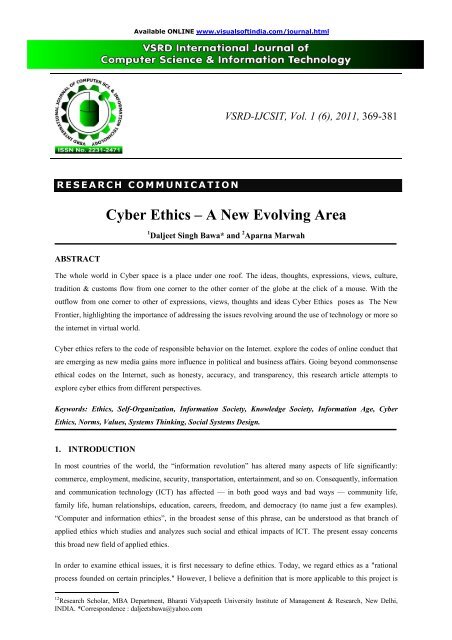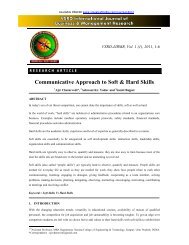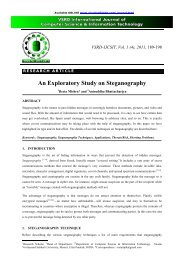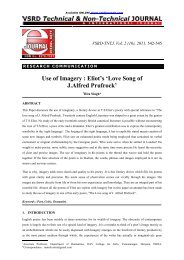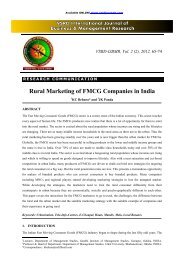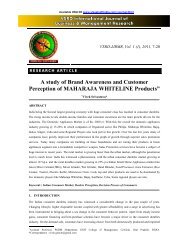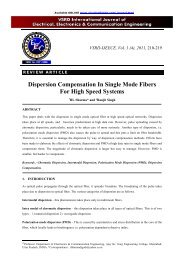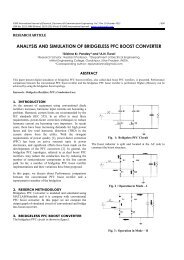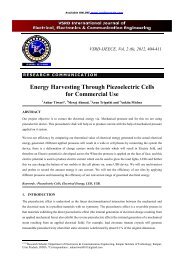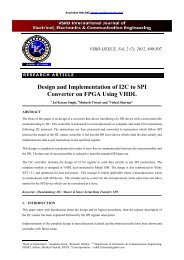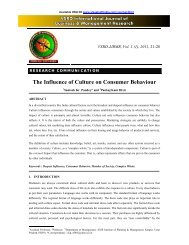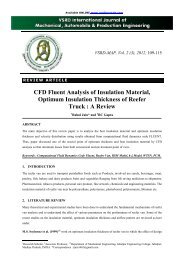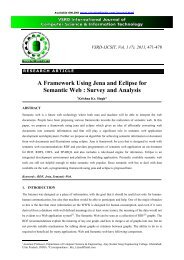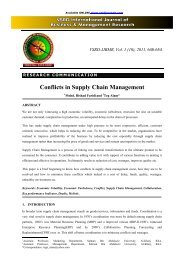Cyber Ethics - vsrd international journals division
Cyber Ethics - vsrd international journals division
Cyber Ethics - vsrd international journals division
Create successful ePaper yourself
Turn your PDF publications into a flip-book with our unique Google optimized e-Paper software.
Available ONLINE www.visualsoftindia.com/journal.html<br />
VSRD-IJCSIT, Vol. 1 (6), 2011, 369-381<br />
R E S E A R C H C O M M U N II C A T II O N<br />
<strong>Cyber</strong> <strong>Ethics</strong> – A New Evolving Area<br />
1 Daljeet Singh Bawa* and 2 Aparna Marwah<br />
ABSTRACT<br />
The whole world in <strong>Cyber</strong> space is a place under one roof. The ideas, thoughts, expressions, views, culture,<br />
tradition & customs flow from one corner to the other corner of the globe at the click of a mouse. With the<br />
outflow from one corner to other of expressions, views, thoughts and ideas <strong>Cyber</strong> <strong>Ethics</strong> poses as The New<br />
Frontier, highlighting the importance of addressing the issues revolving around the use of technology or more so<br />
the internet in virtual world.<br />
<strong>Cyber</strong> ethics refers to the code of responsible behavior on the Internet. explore the codes of online conduct that<br />
are emerging as new media gains more influence in political and business affairs. Going beyond commonsense<br />
ethical codes on the Internet, such as honesty, accuracy, and transparency, this research article attempts to<br />
explore cyber ethics from different perspectives.<br />
Keywords: <strong>Ethics</strong>, Self-Organization, Information Society, Knowledge Society, Information Age, <strong>Cyber</strong><br />
<strong>Ethics</strong>, Norms, Values, Systems Thinking, Social Systems Design.<br />
1. INTRODUCTION<br />
In most countries of the world, the “information revolution” has altered many aspects of life significantly:<br />
commerce, employment, medicine, security, transportation, entertainment, and so on. Consequently, information<br />
and communication technology (ICT) has affected — in both good ways and bad ways — community life,<br />
family life, human relationships, education, careers, freedom, and democracy (to name just a few examples).<br />
“Computer and information ethics”, in the broadest sense of this phrase, can be understood as that branch of<br />
applied ethics which studies and analyzes such social and ethical impacts of ICT. The present essay concerns<br />
this broad new field of applied ethics.<br />
In order to examine ethical issues, it is first necessary to define ethics. Today, we regard ethics as a "rational<br />
process founded on certain principles." However, I believe a definition that is more applicable to this project is<br />
____________________________<br />
12 Research Scholar, MBA Department, Bharati Vidyapeeth University Institute of Management & Research, New Delhi,<br />
INDIA. *Correspondence : daljeetsbawa@yahoo.com
Daljeet Singh Bawa et. al / VSRD International Journal of CS & IT Vol. 1 (6), 2011<br />
the ethical theory that existed in ancient Greece. There, ethics was the study of what was good for both the<br />
individual and society. We will look at some online issues and how they may be good and/or bad for society.<br />
<strong>Cyber</strong> ethics is quite simply the study of ethics on the Internet. "<strong>Ethics</strong> begins when elements within a moral<br />
system conflict." <strong>Cyber</strong>ethics is often called as Information System <strong>Ethics</strong>.<br />
Information System ethics can be defined as "The study of moral, legal, ethical issues involving the use of<br />
information and communication technologies". There are many unique challenges we face in this age of<br />
information. They stem from the nature of information itself. Information is the means through which the mind<br />
expands and increases its capacity to achieve its goals, often as the result of an input from another mind. Thus,<br />
information forms the intellectual capital from which human beings craft their lives and secure dignity.<br />
However, the building of intellectual capital is vulnerable in many ways. For example, people's intellectual<br />
capital is impaired whenever they lose their personal information without being compensated for it, when they<br />
are precluded access to information which is of value to them, when they have revealed information they hold<br />
intimate, or when they find out that the information upon which their living depends is in error. The social<br />
contract among people in the information age must deal with these threats to human dignity. The ethical issues<br />
involved are many and varied in Information System <strong>Ethics</strong>.<br />
<strong>Ethics</strong> is required in information Systems to overcome the following ethical issues.<br />
Privacy: What information about one's self or one's associations must a person reveal to others, under what<br />
conditions and with what safeguards? What things can people keep to themselves and not be forced to reveal to<br />
others?<br />
Accuracy: Who is responsible for the authenticity, fidelity and accuracy of information? Similarly, who is to be<br />
held accountable for errors in information and how is the injured party to be made whole?<br />
Property: Who owns information? What are the just and fair prices for its exchange? Who owns the channels,<br />
especially the airways, through which information is transmitted? How should access to this scarce resource be<br />
allocated?<br />
Accessibility: What information does a person or an organization have a right or a privilege to obtain, under<br />
what conditions and with what safeguards?<br />
Information System ethics explores and evaluates:<br />
<br />
<br />
<br />
<br />
the development of moral values in the information field,<br />
the creation of new power structures in the information field, information myths,<br />
hidden contradictions and intentionality's in information theories and practices,<br />
the development of ethical conflicts in the information field. etc<br />
“Computer ethics” also has been used to refer to a kind of professional ethics in which computer professionals<br />
Page 370 of 381
Daljeet Singh Bawa et. al / VSRD International Journal of CS & IT Vol. 1 (6), 2011<br />
apply codes of ethics and standards of good practice within their profession. In addition, other more specific<br />
names, like “cyberethics” and “Internet ethics”, have been used to refer to aspects of computer ethics associated<br />
with the Internet.<br />
During the past several decades, the robust and rapidly growing field of computer and information ethics has<br />
generated new university courses, research professorships, research centers, conferences, workshops,<br />
professional organizations, curriculum materials, books and <strong>journals</strong>.<br />
2. THE FOUNDATION OF COMPUTER AND INFORMATION ETHICS<br />
In the mid 1940s, innovative developments in science and philosophy led to the creation of a new branch of<br />
ethics that would later be called “computer ethics” or “information ethics”. The founder of this new<br />
philosophical field was the American scholar Norbert Wiener, a professor of mathematics and engineering at<br />
MIT. During the Second World War, together with colleagues in America and Great Britain, Wiener helped to<br />
develop electronic computers and other new and powerful information technologies. While engaged in this war<br />
effort, Wiener and colleagues created a new branch of applied science that Wiener named “cybernetics” (from<br />
the Greek word for the pilot of a ship). Even while the War was raging, Wiener foresaw enormous social and<br />
ethical implications of cybernetics combined with electronic computers. He predicted that, after the War, the<br />
world would undergo “a second industrial revolution” — an “automatic age” with “enormous potential for good<br />
and for evil” that would generate a staggering number of new ethical challenges and opportunities.<br />
In laying down a foundation for information ethics, Wiener developed a cybernetic view of human nature and<br />
society, which led him to an ethically suggestive account of the purpose of a human life. Based upon this, he<br />
adopted “great principles of justice” that he believed all societies ought to follow. These powerful ethical<br />
concepts enabled Wiener to analyze information ethics issues of all kinds.<br />
Underlying metaphysics in cyberethics – Newell Simon Model (Human being as information processor)<br />
A human being can hear, see, touch, feel and smell. These senses are then transmitted to the brain, which<br />
analyses them and comes out with appropriate responses. This human behavior could be explained in terms of<br />
information processing.<br />
The sensory receptors (ears, eyes, nose, etc. ) pick up / receive signals, which are then transmitted to the brain.<br />
The signals are then processed by the brain and appropriate responses are communicated. Thus, the signals from<br />
sensory receptors become inputs. These signals are transmitted through the nervous system, which acts as a<br />
channel or medium. These signals are communicated to the brain which acts as a CPU. The processing leads to<br />
responses, which can be considered as outputs.<br />
Using the language of today's “information age” we would say that, according to Wiener, human beings are<br />
“information objects”; and their intellectual capacities, as well as their personal identities, are dependent upon<br />
persisting patterns of information and information processing within the body, rather than on specific bits of<br />
matter-energy.<br />
Page 371 of 381
Daljeet Singh Bawa et. al / VSRD International Journal of CS & IT Vol. 1 (6), 2011<br />
3. DISTINGUISHING BETWEEN RIGHT AND WRONG?<br />
According to Wiener, for human beings to flourish they must be free to engage in creative and flexible actions<br />
and thereby maximize their full potential as intelligent, decision-making beings in charge of their own lives.<br />
This is the purpose of a human life. Because people have various levels of talent and possibility, however, one<br />
person's achievements will be different from those of others. It is possible, though, to lead a good human life —<br />
to flourish — in an indefinitely large number of ways; for example, as a diplomat, scientist, teacher, nurse,<br />
doctor, soldier, housewife, midwife, musician, artist, tradesman, artisan, and so on.<br />
Information ethics does not require the expertise of a trained professional (although such expertise might prove<br />
to be helpful in many situations). Any adult who functions successfully in a reasonably just society is likely to<br />
be familiar with the existing customs, practices, rules and laws that govern a person's behavior in that society<br />
and enable one to tell whether a proposed action or policy would be accepted as ethical. So this helps us in<br />
coping with the introduction of new information technology — whether they are computer professionals,<br />
business people, workers, teachers, parents, public-policy makers, or others — can and should engage in<br />
information ethics by helping to integrate new information technology into society in an ethically acceptable<br />
way. Information ethics, understood in this very broad sense, is too important to be left only to information<br />
professionals or to philosophers. Wiener's information ethics interests, ideas and methods were very broad,<br />
covering not only topics in the specific field of “computer ethics”, as we would call it today, but also issues in<br />
related areas that, today, are called “agent ethics”, “Internet ethics”, and “nanotechnology ethics”.<br />
On similar lines, while interacting through a computer, a person needs to be nice to the ones he/she interacts<br />
with. Moor's explanation of the revolutionary power of computer technology was that computers are “logically<br />
malleable”:<br />
Computers are logically malleable in that they can be shaped and molded to do any activity that can be<br />
characterized in terms of inputs, outputs and connecting logical operations . Because logic applies everywhere,<br />
the potential applications of computer technology appear limitless. The computer is the nearest thing we have to<br />
a universal tool. Indeed, the limits of computers are largely the limits of our own creativity.<br />
The logical malleability of computer technology, said Moor, makes it possible for people to do a vast number of<br />
things that they were not able to do before. Since no one could do them before, the question never arose as to<br />
whether one ought to do them. In addition, because they could not be done before, no laws or standards of good<br />
practice or specific ethical rules were established to govern them. Moor called such situations “policy vacuums”,<br />
and some of them might generate “conceptual muddles”:<br />
A typical problem in computer ethics arises because there is a policy vacuum about how computer technology<br />
should be used. Computers provide us with new capabilities and these in turn give us new choices for action.<br />
Often, either no policies for conduct in these situations exist or existing policies seem inadequate. A central task<br />
of computer ethics is to determine what we should do in such cases, that is, formulate policies to guide our<br />
actions. One difficulty is that along with a policy vacuum there is often a conceptual vacuum. Although a<br />
problem in computer ethics may seem clear initially, a little reflection reveals a conceptual muddle. What is<br />
needed in such cases is an analysis that provides a coherent conceptual framework within which to formulate a<br />
Page 372 of 381
Daljeet Singh Bawa et. al / VSRD International Journal of CS & IT Vol. 1 (6), 2011<br />
policy for action [20][21]<br />
Moor's approach to computer ethics is a practical theory that provides a broad perspective on the nature of the<br />
“information revolution”. By using the notions of “logical malleability”, “policy vacuums”, “conceptual<br />
muddles”, “core values” and “just consequentialism”, he provides the following problem-solving method:<br />
<br />
<br />
<br />
Identify a policy vacuum generated by computing technology.<br />
Eliminate any conceptual muddles.<br />
Use the core values and the ethical resources of just consequentialism to revise existing — but inadequate<br />
— policies, or else to create new policies that justly eliminate the vacuum and resolve the original ethical<br />
issue.<br />
The third step is accomplished by combining deontology and consequentialism — which traditionally have been<br />
considered incompatible rival ethics theories — to achieve the following practical results:<br />
The “human-values approach” by Norbert Wiener to computer ethics has been very fruitful. It has served, for<br />
example, as an organizing theme for major computer-ethics conferences, such as the 1991 National Conference<br />
on Computing and Values at Southern Connecticut State University (see the section below on “exponential<br />
growth”), which was devoted to the impacts of computing upon security, property, privacy, knowledge, freedom<br />
and opportunities. In the late 1990s, a similar approach to computer ethics, called “value-sensitive computer<br />
design”, emerged based upon the insight that potential computer-ethics problems can be avoided, while new<br />
technology is under development, by anticipating possible harm to human values and designing new technology<br />
from the very beginning in ways that prevent such harm. [6][22]<br />
4. EXEMPLARY TOPICS IN COMPUTER ETHICS<br />
No matter which re-definition of computer ethics one chooses, the best way to understand the nature of the field<br />
is through some representative examples of the issues and problems that have attracted research and scholarship.<br />
Consider, for example, the following topics:<br />
<br />
<br />
<br />
<br />
<br />
<br />
<br />
Computers in the Workplace<br />
Computer Crime<br />
Privacy and Anonymity<br />
Intellectual Property<br />
Professional Responsibility<br />
Globalization<br />
The Metaethics of Computer <strong>Ethics</strong><br />
Page 373 of 381
Daljeet Singh Bawa et. al / VSRD International Journal of CS & IT Vol. 1 (6), 2011<br />
5. COMPUTERS IN THE WORKPLACE<br />
As a “universal tool” that can, in principle, perform almost any task, computers obviously pose a threat to jobs.<br />
Although they occasionally need repair, computers don't require sleep, they don't get tired, they don't go home<br />
ill or take time off for rest and relaxation. At the same time, computers are often far more efficient than humans<br />
in performing many tasks. Therefore, economic incentives to replace humans with computerized devices are<br />
very high. Indeed, in the industrialized world many workers already have been replaced by computerized<br />
devices — bank tellers, auto workers, telephone operators, typists, graphic artists, security guards, assembly-line<br />
workers, and on and on. In addition, even professionals like medical doctors, lawyers, teachers, accountants and<br />
psychologists are finding that computers can perform many of their traditional professional duties quite<br />
effectively.<br />
Consider, for example, the fact that the computer industry already has generated a wide variety of new jobs:<br />
hardware engineers, software engineers, systems analysts, webmasters, information technology teachers,<br />
computer sales clerks, and so on. In the long run, information technology has created many more jobs than it<br />
seems to have eliminated.<br />
Even when a job is not eliminated by computers, it can be radically altered. For example, airline pilots still sit at<br />
the controls of commercial airplanes; but during much of a flight the pilot simply watches as a computer flies<br />
the plane. Similarly, those who prepare food in restaurants or make products in factories may still have jobs; but<br />
often they simply push buttons and watch as computerized devices actually perform the needed tasks. In this<br />
way, it is possible for computers to cause “de-skilling” of workers, turning them into passive observers and<br />
button pushers. Again, however, the picture is not all bad because computers also have generated new jobs<br />
which require new sophisticated skills to perform — for example, “computer assisted drafting” and “keyhole”<br />
surgery.<br />
Another workplace issue concerns health and safety. As Forester and Morrison point out, when information<br />
technology is introduced into a workplace, it is important to consider likely impacts upon health and job<br />
satisfaction of workers who will use it. It is possible, for example, that such workers will feel stressed trying to<br />
keep up with high-speed computerized devices — or they may be injured by repeating the same physical<br />
movement over and over — or their health may be threatened by radiation emanating from computer monitors.<br />
These are just a few of the social and ethical issues that arise when information technology is introduced into the<br />
workplace.<br />
6. COMPUTER CRIME<br />
In this era of computer “viruses” and <strong>international</strong> spying by “hackers” who are thousands of miles away, it is<br />
clear that computer security is a topic of concern in the field of Computer <strong>Ethics</strong>. The problem is not so much<br />
the physical security of the hardware (protecting it from theft, fire, flood, etc.), but rather “logical security”,<br />
which divide into five aspects:<br />
<br />
<br />
Privacy and confidentiality<br />
Integrity — assuring that data and programs are not modified without proper authority<br />
Page 374 of 381
Daljeet Singh Bawa et. al / VSRD International Journal of CS & IT Vol. 1 (6), 2011<br />
<br />
<br />
<br />
Unimpaired service<br />
Consistency — ensuring that the data and behavior we see today will be the same tomorrow<br />
Controlling access to resources<br />
Malicious kinds of software, or “programmed threats”, provide a significant challenge to computer security.<br />
These include “viruses”, which cannot run on their own, but rather are inserted into other computer programs;<br />
“worms” which can move from machine to machine across networks, and may have parts of themselves running<br />
on different machines; “Trojan horses” which appear to be one sort of program, but actually are doing damage<br />
behind the scenes; “logic bombs” which check for particular conditions and then execute when those conditions<br />
arise; and “bacteria” or “rabbits” which multiply rapidly and fill up the computer's memory.<br />
Computer crimes, such as embezzlement or planting of logic bombs, are normally committed by trusted<br />
personnel who have permission to use the computer system. Computer security, therefore, must also be<br />
concerned with the actions of trusted computer users.<br />
Another major risk to computer security is the so-called “hacker” who breaks into someone's computer system<br />
without permission. Some hackers intentionally steal data or commit vandalism, while others merely “explore”<br />
the system to see how it works and what files it contains. These “explorers” often claim to be benevolent<br />
defenders of freedom and fighters against rip-offs by major corporations or spying by government agents. These<br />
self-appointed vigilantes of cyberspace say they do no harm, and claim to be helpful to society by exposing<br />
security risks. However every act of hacking is harmful, because any known successful penetration of a<br />
computer system requires the owner to thoroughly check for damaged or lost data and programs. Even if the<br />
hacker did indeed make no changes, the computer's owner must run through a costly and time-consuming<br />
investigation of the compromised system.<br />
7. PRIVACY AND ANONYMITY<br />
One of the earliest computer ethics topics to arouse public interest was privacy. For example, in the mid-1960s<br />
the American government already had created large databases of information about private citizens (census data,<br />
tax records, military service records, welfare records, and so on). In the US Congress, bills were introduced to<br />
assign a personal identification number to every citizen and then gather all the government's data about each<br />
citizen under the corresponding ID number. A public outcry about “big-brother government” caused Congress to<br />
scrap this plan and led the US President to appoint committees to recommend privacy legislation. In the early<br />
1970s, major computer privacy laws were passed in the USA. Ever since then, computer-threatened privacy has<br />
remained as a topic of public concern. The ease and efficiency with which computers and computer networks<br />
can be used to gather, store, search, compare, retrieve and share personal information make computer<br />
technology especially threatening to anyone who wishes to keep various kinds of “sensitive” information (e.g.,<br />
medical records) out of the public domain or out of the hands of those who are perceived as potential threats.<br />
During the past decade, commercialization and rapid growth of the internet; the rise of the world-wide-web;<br />
increasing “user-friendliness” and processing power of computers; and decreasing costs of computer technology<br />
have led to new privacy issues, such as data-mining, data matching, recording of “click trails” on the web, and<br />
Page 375 of 381
Daljeet Singh Bawa et. al / VSRD International Journal of CS & IT Vol. 1 (6), 2011<br />
so on [22][23] .<br />
The variety of privacy-related issues generated by computer technology has led philosophers and other thinkers<br />
to re-examine the concept of privacy itself. Since the mid-1960s, for example, a number of scholars have<br />
elaborated a theory of privacy defined as “control over personal information” .On the other hand, philosophers<br />
Moor and Tavani have argued that control of personal information is insufficient to establish or protect privacy,<br />
and “the concept of privacy itself is best defined in terms of restricted access, not control” [21][22] . In addition,<br />
Nissenbaum has argued that there is even a sense of privacy in public spaces, or circumstances “other than the<br />
intimate.” An adequate definition of privacy, therefore, must take account of “privacy in public” [22] . As<br />
computer technology rapidly advances — creating ever new possibilities for compiling, storing, accessing and<br />
analyzing information — philosophical debates about the meaning of “privacy” will likely continue [19].<br />
Questions of anonymity on the internet are sometimes discussed in the same context with questions of privacy<br />
and the internet, because anonymity can provide many of the same benefits as privacy. For example, if someone<br />
is using the internet to obtain medical or psychological counseling, or to discuss sensitive topics (for example,<br />
AIDS, abortion, gay rights, venereal disease, political dissent), anonymity can afford protection similar to that of<br />
privacy. Similarly, both anonymity and privacy on the internet can be helpful in preserving human values such<br />
as security, mental health, self-fulfillment and peace of mind. Unfortunately, privacy and anonymity also can be<br />
exploited to facilitate unwanted and undesirable computer-aided activities in cyberspace, such as money<br />
laundering, drug trading, terrorism, or preying upon the vulnerable [23].<br />
8. INTELLECTUAL PROPERTY<br />
One of the more controversial areas of computer ethics concerns the intellectual property rights connected with<br />
software ownership. Today, intellectual property protection is the key factor for economic growth and<br />
advancement in the high technology sector. Some people, like Richard Stallman who started the Free Software<br />
Foundation, believe that software ownership should not be allowed at all. He claims that all information should<br />
be free, and all programs should be available for copying, studying and modifying by anyone who wishes to do<br />
so. Others argue that software companies or programmers would not invest weeks and months of work and<br />
significant funds in the development of software if they could not get the investment back in the form of license<br />
fees or sales.<br />
The traditional tool for dealing with use and misuse of information is intellectual property law, the constellation<br />
of statutes and case law that govern copyrights, patents, and trade secrets. Part of the case for granting rights in<br />
intellectual property (IP) is the belief that protecting IP promotes the development of new products and services,<br />
and that erosion of those rights could threaten the economic performance of the information sector and curtail<br />
the major benefits it has brought. But with this new abundance of information and the ease with which it can be<br />
accessed, reproduced, and distributed have come problems that must be seen in all of their complexity, including<br />
related economic, social, technical, and philosophical concerns, as well as the accompanying legal and policy<br />
challenges. Debates over these issues matter because the outcome will have a significant impact on today's<br />
information sector companies and will help determine the character of the digital economy of the future.<br />
The task of intellectual property protection has always been difficult, attempting as it does to achieve a finely<br />
Page 376 of 381
Daljeet Singh Bawa et. al / VSRD International Journal of CS & IT Vol. 1 (6), 2011<br />
tuned balance: providing authors and publishers enough control over their work that they are motivated to create<br />
and disseminate, while seeking to limit that control so that society as a whole benefits from access to the work.<br />
Today's software industry is a multibillion dollar part of the economy; and software companies claim to lose<br />
billions of dollars per year through illegal copying (“software piracy”). Many people think that software should<br />
be ownable, but “casual copying” of personally owned programs for one's friends should also be permitted [23].<br />
The software industry claims that millions of dollars in sales are lost because of such copying. Ownership is a<br />
complex matter, since there are several different aspects of software that can be owned and three different types<br />
of ownership: copyrights, trade secrets, and patents. One can own the following aspects of a program:<br />
<br />
<br />
<br />
<br />
The “source code” which is written by the programmer(s) in a high-level computer language like Java or<br />
C++.<br />
The “object code”, which is a machine-language translation of the source code.<br />
The “algorithm”, which is the sequence of machine commands that the source code and object code<br />
represent.<br />
The “look and feel” of a program, which is the way the program appears on the screen and interfaces with<br />
users.<br />
A very controversial issue today is owning a patent on a computer algorithm. According to The League for<br />
Programming Freedom, 1992, a patent provides an exclusive monopoly on the use of the patented item, so the<br />
owner of an algorithm can deny others use of the mathematical formulas that are part of the algorithm.<br />
Mathematicians and scientists are outraged, claiming that algorithm patents effectively remove parts of<br />
mathematics from the public domain, and thereby threaten to cripple science. In addition, running a preliminary<br />
“patent search” to make sure that your “new” program does not violate anyone's software patent is a costly and<br />
time-consuming process. As a result, only very large companies with big budgets can afford to run such a<br />
search. This effectively eliminates many small software companies, stifling competition and decreasing the<br />
variety of programs available to the society.<br />
9. PROFESSIONAL RESPONSIBILITY<br />
Computer professionals have specialized knowledge and often have positions with authority and respect in the<br />
community. For this reason, they are able to have a significant impact upon the world, including many of the<br />
things that people value. Along with such power to change the world comes the duty to exercise that power<br />
responsibly. Computer professionals find themselves in a variety of professional relationships with other people<br />
including [13] :<br />
employer<br />
— employee<br />
Client<br />
— professional<br />
professional — professional<br />
Page 377 of 381
Daljeet Singh Bawa et. al / VSRD International Journal of CS & IT Vol. 1 (6), 2011<br />
Society<br />
— Professional<br />
These relationships involve a diversity of interests, and sometimes these interests can come into conflict with<br />
each other. Responsible computer professionals, therefore, will be aware of possible conflicts of interest and try<br />
to avoid them.<br />
Professional organizations in the USA, like the Association for Computing Machinery (ACM) and the Institute<br />
of Electrical and Electronic Engineers (IEEE), have established codes of ethics, curriculum guidelines and<br />
accreditation requirements to help computer professionals understand and manage ethical responsibilities. For<br />
example, in 1991 a Joint Curriculum Task Force of the ACM and IEEE adopted a set of guidelines (“Curriculum<br />
1991”) for college programs in computer science. The guidelines say that a significant component of computer<br />
ethics (in the broad sense) should be included in undergraduate education in computer science.<br />
In addition, both the ACM and IEEE have adopted Codes of <strong>Ethics</strong> for their members. The most recent ACM<br />
Code (1992), for example, includes “general moral imperatives”, such as “avoid harm to others” and “be honest<br />
and trustworthy”. And also included are “more specific professional responsibilities” like “acquire and maintain<br />
professional competence” and “know and respect existing laws pertaining to professional work.” The IEEE<br />
Code of <strong>Ethics</strong> (1990) includes such principles as “avoid real or perceived conflicts of interest whenever<br />
possible” and “be honest and realistic in stating claims or estimates based on available data.”<br />
The Accreditation Board for Engineering Technologies (ABET) has long required an ethics component in the<br />
computer engineering curriculum. And in 1991, the Computer Sciences Accreditation Commission/Computer<br />
Sciences Accreditation Board (CSAC/CSAB) also adopted the requirement that a significant component of<br />
computer ethics be included in any computer sciences degree granting program that is nationally accredited [12].<br />
It is clear that professional organizations in computer science recognize and insist upon standards of<br />
professional responsibility for their members.<br />
10. GLOBALIZATION<br />
Computer ethics today is rapidly evolving into a broader and even more important field, which might reasonably<br />
be called “global information ethics”. Global networks like the Internet and especially the world-wide-web are<br />
connecting people all over the earth. “The Computer Revolution and the Problem of Global <strong>Ethics</strong>”, for the first<br />
time in history, efforts to develop mutually agreed standards of conduct, and efforts to advance and defend<br />
human values, are being made in a truly global context. So, for the first time in the history of the earth, ethics<br />
and values will be debated and transformed in a context that is not limited to a particular geographic region, or<br />
constrained by a specific religion or culture [7][8]. This may very well be one of the most important social<br />
developments in history. Consider just a few of the global issues:<br />
10.1. Global Laws<br />
If computer users in the United States, for example, wish to protect their freedom of speech on the internet,<br />
whose laws apply? Nearly two hundred countries are already interconnected by the internet, so the United States<br />
Page 378 of 381
Daljeet Singh Bawa et. al / VSRD International Journal of CS & IT Vol. 1 (6), 2011<br />
Constitution (with its First Amendment protection for freedom of speech) is just a “local law” on the internet —<br />
it does not apply to the rest of the world. How can issues like freedom of speech, control of “pornography”,<br />
protection of intellectual property, invasions of privacy, and many others to be governed by law when so many<br />
countries are involved? If a citizen in a European country, for example, has internet dealings with someone in a<br />
far-away land, and the government of that land considers those dealings to be illegal, can the European be tried<br />
by the courts in the far-away country?<br />
10.2. Global <strong>Cyber</strong>business<br />
The world is very close to having technology that can provide electronic privacy and security on the internet<br />
sufficient to safely conduct <strong>international</strong> business transactions. Once this technology is in place, there will be a<br />
rapid expansion of global “cyberbusiness”. Nations with a technological infrastructure already in place will<br />
enjoy rapid economic growth, while the rest of the world lags behind. What will be the political and economic<br />
fallout from rapid growth of global cyberbusiness? Will accepted business practices in one part of the world be<br />
perceived as “cheating” or “fraud” in other parts of the world? Will a few wealthy nations widen the already big<br />
gap between rich and poor? Will political and even military confrontations emerge?<br />
10.3. Global Education<br />
If inexpensive access to the global information net is provided to rich and poor alike — to poverty-stricken<br />
people in ghettos, to poor nations in the “third world”, etc. — for the first time in history, nearly everyone on<br />
earth will have access to daily news from a free press; to texts, documents and art works from great libraries and<br />
museums of the world; to political, religious and social practices of peoples everywhere. What will be the<br />
impact of this sudden and profound “global education” upon political dictatorships, isolated communities,<br />
coherent cultures, religious practices, etc.? As great universities of the world begin to offer degrees and<br />
knowledge modules via the internet, will “lesser” universities be damaged or even forced out of business?<br />
11. INFORMATION RICH AND INFORMATION POOR<br />
The gap between rich and poor nations, and even between rich and poor citizens in industrialized countries, is<br />
already disturbingly wide. As educational opportunities, business and employment opportunities, medical<br />
services and many other necessities of life move more and more into cyberspace, will gaps between the rich and<br />
the poor become even worse?<br />
So, it needs to be understood that <strong>Cyber</strong> ethics is no different from any other kind of ethics. To be ethical, you<br />
must make the moral choice to obey the laws, respect people and property, and play by the rules. In every area<br />
of life, you should do the right thing no matter who's the boss or who's watching. An Acceptable Use Policy<br />
should be a clear reminder that in the cyber world, your ethics should not be virtual but be real.<br />
The policy should inculcate the following ten commandments of computer ethics :<br />
<br />
It is unethical to use a computer to harm another user. It includes harming or corrupting some other user's<br />
data or files.<br />
Page 379 of 381
Daljeet Singh Bawa et. al / VSRD International Journal of CS & IT Vol. 1 (6), 2011<br />
<br />
<br />
<br />
<br />
<br />
<br />
<br />
<br />
<br />
The development or the spread of such malicious software such as viruses is unethical.<br />
It is unethical to read another person's email messages. Snooping around in another person's files or reading<br />
someone else's personal messages is the invasion of his/her privacy. In order to protect the information from<br />
being attacked, it is ethical to apply encryption schemes to it.<br />
The stealing of sensitive information such as the personal information of the employees from an employee<br />
database, or breaking into bank accounts for the retrieval of confidential information is nothing less than<br />
robbery.<br />
Computers are the easiest sources of spreading information to the masses by means of Internet. Rumors can<br />
be spread speedily and easily through the Internet and being involved in the circulation of incorrect<br />
information is unethical.<br />
Obtaining illegal copies of copyrighted software is unethical.<br />
It is not ethical to hack passwords for gaining an unauthorized access to a password driven computer<br />
system.<br />
Programs developed by a programmer in an organization are his/her property. Copying them and<br />
propagating them in one's own name is unethical.<br />
A computer program goes a long way to reach homes of the masses. The computer program should be<br />
designed keeping in mind the interests of the society.<br />
While interacting through a computer, a person needs to be nice to the ones he/she interacts with.<br />
The Ten Commandments of Computer <strong>Ethics</strong> are the means to build a set of regulations to guide the individual<br />
users to base computer related operations on strong ethical values. The commandments are a way to make<br />
people understand the ethics involved in the use of technology.<br />
There is a long way to go ahead to make cyberethics a successful practice.<br />
12. REFERENCES<br />
[1] Weiner, Norbert. <strong>Cyber</strong>netics. NY: John Wiley and Sons, 1948.<br />
[2] Weiner, Norbert. The Human Use of Human Beings: <strong>Cyber</strong>netics and Society. Cambridge, MA:<br />
Riverside Press, 1950.<br />
[3] Adam, A. (2000), “Gender and Computer <strong>Ethics</strong>,” Computers and Society, 30(4): 17-24.<br />
[4] Bohman, James (2008), “The Transformation of the Public Sphere: Political Authority, Communicative<br />
Freedom, and Internet Publics,” in J. van den Hoven and J. Weckert (eds.), Information Technology and<br />
Moral Philosophy, Cambridge: Cambridge University Press, 66-92.<br />
[5] Brennan, G. and P. Pettit (2008), “Esteem, Identiiability, and the Internet,” in J. van den Hoven and J.<br />
Weckert (eds.), Information Technology and Moral Philosophy, Cambridge: Cambridge University Press,<br />
175-94.<br />
Page 380 of 381
Daljeet Singh Bawa et. al / VSRD International Journal of CS & IT Vol. 1 (6), 2011<br />
[6] Brey, P. (2001), “Disclosive Computer <strong>Ethics</strong>,” in R. Spinello and H. Tavani (eds.), Readings in<br />
<strong>Cyber</strong><strong>Ethics</strong>, Sudbury, MA: Jones and Bartlett.<br />
[7] Bynum, T. (2000), “The Foundation of Computer <strong>Ethics</strong>,” Computers and Society, 30(2): 6-13.<br />
[8] Bynum, T. (2004), “Ethical Challenges to Citizens of the ‘Automatic Age’: Norbert Wiener on the<br />
Information Society,” Journal of Information, Communication and <strong>Ethics</strong> in Society, 2(2): 65-74.<br />
[9] Bynum, T. (2005), “Norbert Wiener's Vision: the Impact of the ‘Automatic Age’ on our Moral Lives,” in<br />
R. Cavalier (ed.), The Impact of the Internet on our Moral Lives, Albany, NY: SUNY Press, 11-25.<br />
[10] Bynum, T. and P. Schubert (1997), “How to do Computer <strong>Ethics</strong> — A Case Study: The Electronic Mall<br />
Bodensee,” in J. van den Hoven (ed.), Computer <strong>Ethics</strong>—Philosophical Enquiry, Rotterdam: Erasmus<br />
University Press, 85-95.<br />
[11] Capurro, R. (2007a), “Information <strong>Ethics</strong> for and from Africa,” International Review of Information<br />
<strong>Ethics</strong>, 2007: 3-13.<br />
[12] Conry, S. (1992), “Interview on Computer Science Accreditation,” in T. Bynum and J. Fodor (creators),<br />
Computer <strong>Ethics</strong> in the Computer Science Curriculum (a video program), Kingston, NY: Educational<br />
Media Resources, Inc.<br />
[13] Debora, Johson; “<strong>Ethics</strong> Online”, Communications of the ACM 40 (1997):60-65.<br />
[14] Floridi, L. (2006a), “Information <strong>Ethics</strong>: Its Nature and Scope,” Computers and Society, 36(3): 21-36.<br />
[15] Floridi, L. (2008), “Information <strong>Ethics</strong>: Its Nature and Scope,” in J. van den Hoven and J. Weckert (eds.),<br />
Information Technology and Moral Philosophy, Cambridge: Cambridge University Press, 40-65.<br />
[16] Fodor, J. and T. Bynum (1992), What Is Computer <strong>Ethics</strong>? (a video program), Kingston, NY: Educational<br />
Media Resources, Inc.<br />
[17] Forester, T. and P. Morrison (1990), Computer <strong>Ethics</strong>: Cautionary Tales and Ethical Dilemmas in<br />
Computing, Cambridge, MA: MIT Press.<br />
[18] Fried, C. (1984), “Privacy,” in F. Schoeman (ed.), Philosophical Dimensions of Privacy, Cambridge:<br />
Cambridge University Press.<br />
[19] Introna, Lucas D. "Workplace Surveillance, Privacy, and Distributive Justice." Readings in <strong>Cyber</strong>ethics.<br />
2nd ed., Ed. Richard A. Spinello and Herman T. Tavani. Boston: Jones and Bartlett Publishers, 2004:<br />
476-487.<br />
[20] Moor, James H. "Toward a Theory of Privacy for the Information Age." Readings in <strong>Cyber</strong>ethics. 2nd ed.<br />
Ed. Richard A. Spinello and Herman T. Tavani. Boston: Jones and Bartlett Publishers, 2004: 407-417.<br />
[21] Moor, James H. "What is Computer <strong>Ethics</strong>?" (1985).<br />
[22] Nissenbaum, Helen. "Toward an Approach to Privacy in Public." Readings in <strong>Cyber</strong>ethics. 2nd ed. Ed.<br />
Richard A. Spinello and Herman T. Tavani. Boston: Jones and Bartlett Publishers, 2004: 450-461.<br />
[23] Tavani, Herman T. "Defining the Boundaries of Computer Crime." Readings in <strong>Cyber</strong>ethics. 2nd ed. Ed.<br />
Richard A. Spinello and Herman T. Tavani. Boston: Jones and Bartlett Publishers, 2004: 513-524.<br />
[24] Tavani, Herman T. "Privacy, Protection, Control of Information and Privacy Enhancing Technologies."<br />
Readings in <strong>Cyber</strong>ethics. 2nd ed. Ed. Richard A. Spinello and Herman T. Tavani. Boston: Jones and<br />
Bartlett Publishers, 2004: 436-449.<br />
<br />
Page 381 of 381


